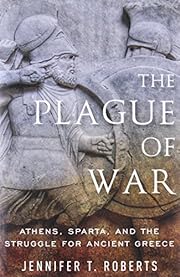

Clique em uma foto para ir ao Google Livros
|
Carregando... The Plague of War: Athens, Sparta, and the Struggle for Ancient Greece (Ancient Warfare and Civilization)de Jennifer T. Roberts
 Nenhum(a) Ainda não há conversas na Discussão sobre este livro. The Peloponnesian War is one of those subjects which, whenever a new book is published about it, begs the question, "do we really need another book on it?" This is understandable considering that 1) having been written about for nearly 2,500 years it has been one of the most worked-over events in human history, 2) the first of these books, Thucydides's [b:History of the Peloponnesian War|261243|History of the Peloponnesian War|Thucydides|https://images.gr-assets.com/books/1422072332s/261243.jpg|804111], ranks as one of the foundational texts of Western historiography and in many respects will never be bettered, and 3) recently (i.e. within the past half-century) [a:Donald Kagan|12805|Donald Kagan|https://images.gr-assets.com/authors/1411665575p2/12805.jpg] wrote both a four-volume history of the war AND a single-volume condensed version which are difficult to top as a modern account for the conflict. With all of these books, is there space for another? The answer, as Jennifer Roberts proves, is a clear yes. She demonstrates this by fitting the conflict within the context of Greek city-state relations in the 5th and 4th centuries BCE. By widening her focus, she shows the war not as the culmination of inter-city-state rivalry as it has sometimes been presented, but as one of a series of conflicts which neither began nor ended with the war itself. This is not a novel revelation (anybody who has more than a passing familiarity with Hellenic Greek history understands this), but by adopting this approach Roberts makes several more obscure points clearer, foremost among them being that Sparta was not so much the ultimate victor as merely temporarily ascendant among the city-states, with their defeat of Athens setting the stage for their own downfall a generation later. Roberts's approach offers one of the best assessments of the impact of the war upon ancient Greece. While lacking the immediacy of the ancient sources or the thoroughness of Kagan's coverage, she draws upon both sources as well as others to provide a clear-eyed understanding of its true significance. It makes for an excellent resource for anyone seeking to understand a conflict which became one of the great referential points of Western history, because while it may have been only one of many wars the Greeks fought with each other, it has endured in the popular imagination in ways which make it relevant even today. This review was written for LibraryThing Member Giveaways. very informative. I was impressed by the depth of the content. The introduction provides a good historical account of the period. Nicely written, it is a good read. This review was written for LibraryThing Member Giveaways. Very well written. The book is detailed with the academic depth of coverage you would expect from the Oxford University Press but is still readable by an average adult. Too often authors dumb a topic down to an overview of little value or fill the book with unexplained references that make the book difficult to read and requires a separate book to explain the first book.Professor Roberts provides a history of the conflict between Athens and Sparta for the leadership of Ancient Greece that is easy to read and understand. This review was written for LibraryThing Member Giveaways. Being close to 400 pages this books is very encyclopedic in its treatment of The Spartan and Athenian wars. The best part of the book is the introduction which provides a historiological treatment of the period over the span of time. The footnotes invite the reader to explore diverse aspects of the wars that are of interest to the curious historian. The prose is a bit hard to read at time with too much information. It loses its steam and energy midstream. Not a literary classic but a good time to read for the beginning student.
Thucydides’ meditation on the Peloponnesian War and his innovative appeal to human nature to explain the ever-present condition of wars and conflicts has, since antiquity, mesmerized students and scholars of history alike. The book under review narrates these defining years in Western civilization described by Thucydides and is part of the series “Ancient Warfare and Civilization” which aims to explore the decisive events of the ancient world. The author, Jennifer T. Roberts, has previously published widely on Greek history, and delivers in this study a tour de force through a century and a half, taking the reader from the Persian Wars to the Battle of Mantinea, allocating most of the chapters to treating the bitter struggle between Athens and Sparta in the last quarter of the fifth century. The question is whether we really need a new interpretation of a war so widely summarized and analyzed. The answer is a rather surprising yes. Pertence à série publicada
"Tracing the conflict among the city-states of Greece over several generations, this book argues that the Peloponnesian War did not entirely end in 404 with the capture of the Athenian fleet at Aegospotami in 404 B.C. but rather continued in one form or another well into the fourth century"--Provided by publisher. Não foram encontradas descrições de bibliotecas. |
Current DiscussionsNenhum(a)Capas populares
 Google Books — Carregando... Google Books — Carregando...GênerosClassificação decimal de Dewey (CDD)938.05History and Geography Ancient World Greece to 323 Greece to 323 Peloponnesian War (431-404 BC)Classificação da Biblioteca do Congresso dos E.U.A. (LCC)AvaliaçãoMédia: (4.21) (4.21)
É você?Torne-se um autor do LibraryThing. |
|||||||||||||||||||||||||||||||||||||||||||||||||||||||||||||||||||||||||||||||||||||||||||||||||||||||||||||||||||||||||||
From the S&W syllabus: This selection from Roberts picks up the narrative of the war where Thucydides leaves off to explain the final stages of the Peloponnesian War. Central to the story and eventual Athenian defeat are the crucial naval battles of Arginusae and Aegospotami.